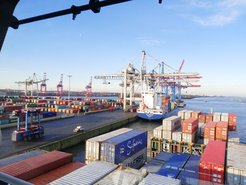Labour Governance in the Shipping Industry: An Anthropological Study of the ILO Maritime Labour Convention, 2006
Wages, pensions, unemployment benefits, health policy: in democratic, industrialized nations throughout the twentieth century, collective bargaining agreements, labour standards, and their legal regulation followed a tripartite structure whereby representatives of governments, corporations, and workers’ unions would sit at the same table and speak with one another. This tripartite principle has underpinned the organization and decision-making processes of the International Labour Organization (ILO) since its foundation in 1919. Both before and after becoming part of the United Nations in 1946, the ILO established fundamental labour standards that have been enacted in more than 190 conventions governing workers’ rights. The ILO still plays a major role in legal guidance and technical assistance for many countries. Yet in the latter part of the twentieth century, the ILO — similar to many other specialized UN agencies — increasingly came under scrutiny as a global organization ill-adapted to today’s realities. The implementation of ILO conventions relies on their incorporation into the labour laws of the various nation-states. However, the rise of global commodity chains and the growing importance of transnational companies considerably blur the legal accountability of corporations beyond national borders. These changes are said to undermine the enforcement mechanisms of the ILO and its tripartite model.
Adopted in 2006, the Maritime Labour Convention (MLC, 2006) is one of these 190 ILO conventions. It establishes minimum working and living standards for all seafarers on merchant vessels. The development of the MLC started in 2001. It was finalized in 2006 but, due to demanding requirements, did not enter into force until 2013. Its negotiations in Geneva followed a classic tripartite scheme involving representatives of governments, ship owners, and seafarers. While it seems to exemplify the limitations of the ILO in many respects, the MLC has been described by the ILO as “the most stringent of any ILO Convention ever adopted in the Organization’s history”. The London-based International Transport Federation (ITF) — the most important trade union representing seafarers’ interests — called it “the first ever true bill of rights for those working at sea”. And according to the American labour historian Leon Fink (2011: 200), the MLC creates “an occupational regulatory framework operating at a scale without parallel in the world today”. There are still numerous cases of abuse of seafarers’ rights, so what can explain such enthusiastic words? How does the MLC, 2006 differ from other ILO conventions? How does it translate into different national laws? And what problems of the shipping industry does it address?
This anthropological research project seeks to answer these questions by exploring the enforcement regime of the MLC, which is backed by a rigorous system of inspections and certification. As of today, the MLC has been ratified by 90 countries representing 91 per cent of the world fleet in gross tonnage. This strong approval relies on a “no more favourable treatment” clause that prevents ships flying flags of states that have not signed the MLC from having an unfair advantage over ships flying the flags of states that have. The implementation of the MLC is based on the circulation of reports and exchange of information between port authorities throughout the world. My multi-sited ethnographic fieldwork for this project will follow the emergence of monitoring tools and track the development of new legal procedures through international cooperation. The main contribution of this project will be to provide a thick ethnographic comparison of the implementation regime of the MLC, 2006 in two port cities: Hamburg and Panama. I intend to explore the risk of the MLC becoming a paper tiger with limited and uneven implementation, the potential challenges and extent of its enforcement, and the limitations of the enforcement penalties in these two ports.

On a container ship in Hamburg, January 2020
